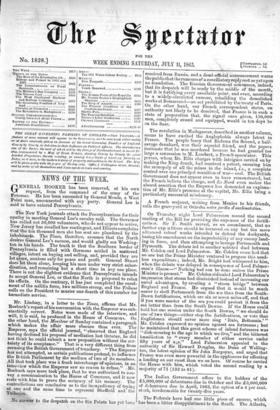On Thursday night Lard Palmerston moved the second reading of
the Bill for providine° the expenses of the fortifi- cations. Sir F. Smith moved, as an amendment, that no further expenditure should be incurred on any but the more advanced inland works intended to defend the dockyards, basing his amendment on the improbability of any enemy land- ing in force, and then attempting to besiege Portsmouth and Plymouth. The debate led to another spirited duel between Mr. Cobden and Lord Palmerston. Mr. Cobden remarked that no one but the Prime Minister ventured to propose this need- less expenditure ; indeed, Mr. Bright had whispered to him, when the debate was delayed in consequence of Lord Palmer- ston's illness—" Nothing bad can be done unless the Prime Minister is present." Mr. Cobden ridiculed Lord Palmerston's impression that steam had diminished instead of increasing our naval advantages, by creating a "steam bridge" between England and France. He argued that it would be much easier to shell Portsmouth from the sea than from the South- Down fortifications, which are six or seven miles off; and that if you were master of the sea you could protect it from the sea better than from the South Downs. If the House could hold but one session under the South Downs, "we should do one of two things—either stop the fortifications, or vote that Englishmen should never more sing 'Rule, Britannia.'" Mr. Cobden expressed no opinion against sea fortresses ; but he maintained that this great scheme of inland fortresses was " dishonouring to the age in which we live," and the bitterest humiliation to " every member of either service under fifty years of a;e." Lord Palmerston appealed to the authority of Sir Howard Douglas, the Duke of Welling- ton, the latest opinion of Sir John Burgoyne, and urged that France was even more powerful in the appliances for effecting a landing on our coast than we on hers. Of course he carried the House with him, which voted the second reading by a majority of 71 (132 to 61).



































